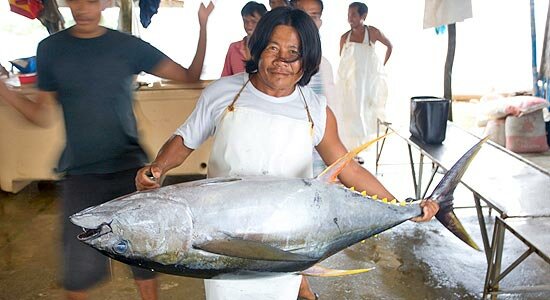So. Is the glass half full, or half empty?
There are of course other options, and it may well be difficult to tell because you are looking at the glass from a funny angle.

The new report underlines that in large swathes of the worlds' fisheries conservation measures are not happening
That certainly seems to be the conclusion when reading the various media interpretations of an important new study published in the journal Science on the world’s fisheries.
The study’s key co-authors are Professor Boris Worm, and Professor Ray Hilborn – who can be seen verbally dueling over the state of the world’s fisheries in The End Of The Line.
Some reports are most excited that the two are actually working together – Worm was famously responsible for the alarm call that commercial fisheries could run out by 2048 unless we change our ways, while Hilborn is a fisheries scientist who has publicly lambasted that prediction.
So, perhaps understandably, some headlines about the new study focus on the ‘Don’t Panic!’ ‘Fish Not Running Out!’
angle.
Others are a little more measured, as it seems are the findings of the study, in agreeing that there is potential for our fisheries to recover – if we take the right action …
The study draws attention to areas where restrictions in fishing have helped fish stocks recover – and concludes that measures like reducing the amount of fishing, restricting the types of fishing, and creating areas which closed to fishing are all necessary things to do.
But it also underlines that in large swathes of the worlds’ fisheries this is not happening - and that the ability to recover varies greatly depending on the area, and the measures taken.
One of the things the study notes is that the sort of fisheries management that does work in helping rebuild stocks is usually only taken after stocks have been drastically over-fished (i.e. It usually takes a crisis situation of our own making to spur us into action, when what we should have been doing is getting it right in the first place).
So this should act as a wake up call – not a reason to do nothing and hope it all works out, but rather as a reason to do much more: banning destructive fishing gears; creating large no-take Marine Reserves; and reducing the amount of fishing that we do.
My favourite headline is this one, however, from the Canadian Press – if only for stating the obvious!
In other news today, and somewhat overshadowed by the Worm-Hilborn report, one of the world’s largest contract caterers has taken the unprecedented move of banning 69 species of fish from its menus.
In undertaking to remove every species on the Marine Conservation Society’s ‘fish to avoid’ list, Compass will be making sure that thousands of outlets across the British Isles are avoiding endangered species, and under-threat stocks.
This is great news, alongside the other efforts being made in the UK by retailers and Chefs, to serve up responsibly-sourced fish. And of course, it places those like Nobu who are defiantly serving up endangered species like bluefin tuna, under ever more pressure.
- Willie MacKenzie is part of Greenpeace’s Ocean Campaign. This blog post originally appeared on the Greenpeace UK website.
![]()



0 Responses to “Good news for fisheries - if we continue conservation measures”
Leave a Reply